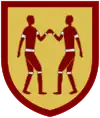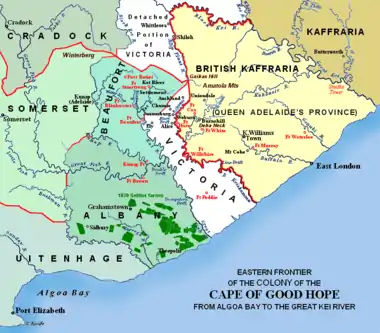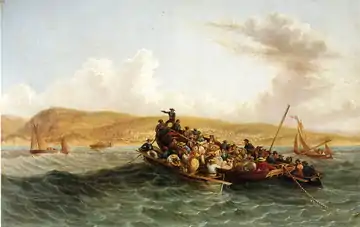1820 Settlers
The 1820 Settlers were several groups of British colonists settled by the government of the United Kingdom government and the Cape Colony authorities in the Eastern Cape of South Africa in 1820.
Part of a series on the |
|---|
| History of South Africa |
 Arms of South Africa |
| Timeline |
|
|

Origins
After the Napoleonic Wars, Britain experienced a serious unemployment problem. Many of the 1820 Settlers were poor and the Cape government encouraged them to settle in the Eastern Cape in an attempt to strengthen the eastern frontier against the neighbouring Xhosa peoples, and to provide a boost to the English-speaking population of South Africa. The settlement policy led to the establishment of Albany, South Africa, a centre of the British diaspora in Africa.
Colonisation
Of the 90,000 applicants, about 4,000 were approved. Many 1820 Settlers initially arrived in the Cape in about 60 different parties between April and June 1820. They were granted farms near the village of Bathurst, Eastern Cape and supplied equipment and food against their deposits, but their lack of agricultural experience led many of them to abandon agriculture and withdraw to Bathurst and other settlements like Grahamstown, East London and Port Elizabeth, where they typically reverted to their trades.
A group of the 1820 Settlers continued on to Natal, then a part of Zululand, home of the Zulu people. At the time, King Shaka ruled the territory with highly trained warriors. Leaders of the Natal settlers requested permission from Shaka to stay on the land. When the king witnessed the settlers' technological advances, permission was granted in return for access to firearm technology.[1] According to genealogist Shelagh O'Byrne Spencer, among 1820 Settlers who moved to Natal were "John Bailie, the founder of East London, and Charles Kestell, after whose son, the Revd John Daniel Kestell of Anglo-Boer War fame, the Free State town of Kestell is named".[2]
Memorial
They are commemorated in Grahamstown by the 1820 Settlers National Monument, which opened in 1974. A living monument, it hosts plays, musical performances and cultural events, and is supported by the 1820 Settlers Association which was founded in 1920 by Sir Walter Stanford and other descendants.
Notable 1820 Settlers

Notes
- Ngubane 1963, p. 30.
- O'Byrne Spencer n.d.
References
- Ngubane, Jordan K. (1963), An African Explains Apartheid, New York: Frederick A. Praeger, Inc.CS1 maint: ref=harv (link)
- O'Byrne Spencer, Shelagh (n.d.). "The European Settler Population of Natal up to 1960, and their Influence Beyond the Borders of the Colony". British Settlers in Natal: 1824–1857.CS1 maint: ref=harv (link)
Further reading
- Mitford-Barberton, Ivan; White, Violet (1969). Some frontier families: biographical sketches of 100 Eastern Province families before 1840. Human and Rousseau.CS1 maint: ref=harv (link)
- Rosenthal, Eric (1973). Encyclopedia of Southern Africa. Systems for Education.CS1 maint: ref=harv (link)
- Whinchcombe Powell, F. (1964). Hancock's Drift: The Story of the Great Wagon Road, by F. Whinchcombe Powell.CS1 maint: ref=harv (link)
- Endemann, L. C. P. (1978). John Parkin of Baakens River Farm and His Family, 1820-1970. Human Sciences Research Council. ISBN 978-0-86965-500-9.CS1 maint: ref=harv (link)
- Spencer, Shelagh O'Byrne (1981). British Settlers in Natal, 1824-1857. Volumes 1 to 7. University of Natal Press. ISBN 978-0-86980-267-0.CS1 maint: ref=harv (link)
External links
| Wikimedia Commons has media related to 1820 Settlers. |